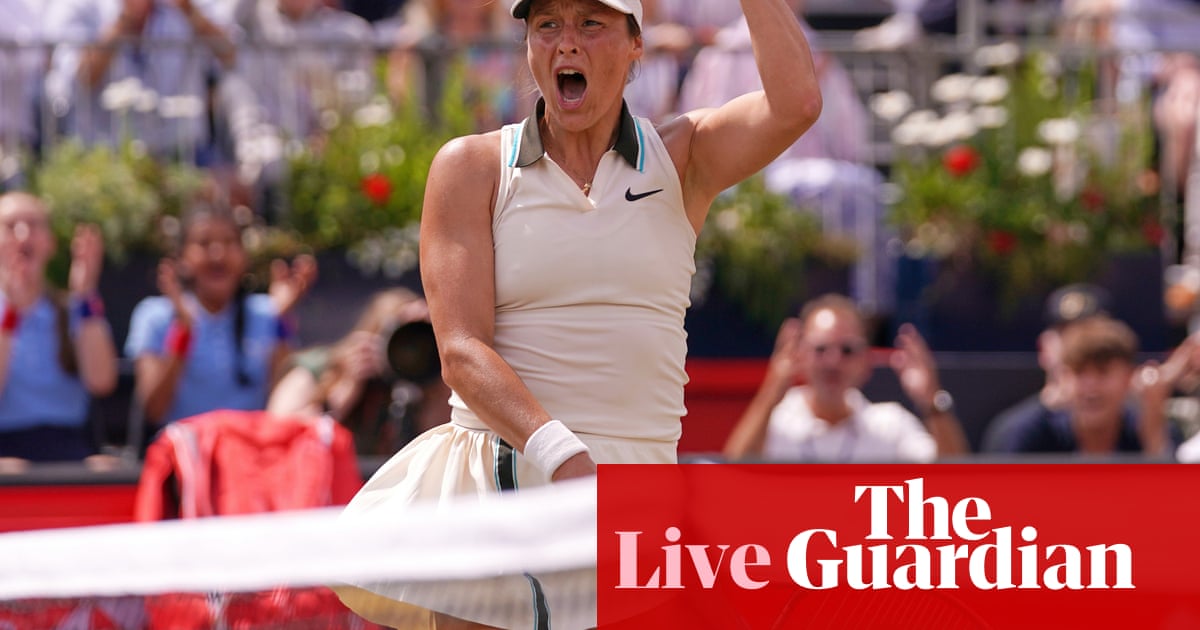What Happened
In the women’s singles final at the Queen’s Club Championships held on June 15, 2025, Amanda Anisimova faced off against Tatjana Maria. Maria, a 37-year-old qualifier and mother of two, emerged victorious with a score of 6-3, 6-4, marking a significant milestone as she became the first woman to win the title at Queen’s Club in 52 years. This victory capped off a remarkable tournament for Maria, who had previously defeated several higher-ranked players, including Madison Keys and Elena Rybakina.
Anisimova, who was ranked No. 15 at the time, had a strong tournament leading up to the final, notably defeating top-seeded Zheng Qinwen in the semifinals. Despite her powerful game and a promising start, Anisimova struggled to find her rhythm against Maria’s strategic play, which relied heavily on slices and spins to disrupt her opponent’s timing. The match showcased Maria’s ability to neutralize Anisimova’s power with her tactical prowess, ultimately leading to Maria’s triumph.
Key Details
- Match Score: Tatjana Maria defeated Amanda Anisimova 6-3, 6-4.
- Date: June 15, 2025.
- Location: Queen’s Club, London.
- Notable Achievements:
- Maria became the first woman to win the Queen’s Club title in 52 years.
- Anisimova reached her first grass-court final.
- Tournament Path:
- Maria defeated No. 2 seed Madison Keys and No. 4 seed Elena Rybakina.
- Anisimova defeated top-seeded Zheng Qinwen in the semifinals.
Multiple Perspectives
The match drew attention for contrasting styles between the two players. Anisimova, known for her aggressive baseline play and powerful groundstrokes, was seen as the favorite due to her higher ranking and recent form. According to analysts, her ability to maintain composure under pressure was crucial in her semifinal win against Zheng, where she showcased resilience despite moments of doubt.
On the other hand, Maria’s performance was characterized by her strategic use of slices and her ability to control the pace of the game. Analysts noted that Maria’s experience and tactical acumen allowed her to neutralize Anisimova’s power effectively. Maria herself expressed disbelief at her achievement, stating, “I try to come down and to realize that I’m really in the final here,” highlighting her surprise at reaching this stage of the tournament.
While Anisimova’s supporters pointed to her potential and recent successes as indicators of her capability to win, Maria’s fans celebrated her underdog status and the significance of her victory at an advanced stage in her career. The match illustrated the dynamic nature of tennis, where experience can sometimes outweigh raw talent.
Context & Background
Amanda Anisimova has been a notable figure in women’s tennis since her breakout performance at the French Open in 2019, where she reached the semifinals at just 17 years old. However, her career faced challenges, including a hiatus in 2023 to focus on her mental health. Her return to form in 2025, marked by a WTA 1000 title win earlier in the year, positioned her as a strong contender in the tournament.
Tatjana Maria, on the other hand, has had a more unconventional career trajectory, taking breaks from the sport to raise her children. Her recent performances have demonstrated a resurgence, particularly on grass, where she has historically performed well. Maria’s victory at Queen’s Club not only underscores her skill but also highlights the growing trend of older players competing successfully against younger talent in women’s tennis.
The significance of the Queen’s Club Championships extends beyond the match itself, as it represents a step towards greater visibility and equality in women’s sports. The final featured two players who have navigated personal and professional challenges, reflecting broader themes in the sport regarding resilience and determination.
What We Don’t Know Yet
While the match concluded with Maria’s victory, questions remain about the future trajectories of both players. For Anisimova, it will be crucial to see how she builds on her recent successes and addresses the inconsistencies that surfaced during the final. Her mental fortitude and ability to maintain focus during high-pressure situations will be key areas to watch as she progresses in her career.
For Maria, the implications of her win at this stage of her career raise questions about her future participation in tournaments and whether she can sustain this level of performance. Additionally, her ability to balance professional commitments with family life will be a significant factor in her ongoing career.
As both players reflect on their experiences at Queen’s Club, the tennis community will be eager to see how they adapt and evolve in the coming months, particularly with major tournaments like Wimbledon on the horizon.


